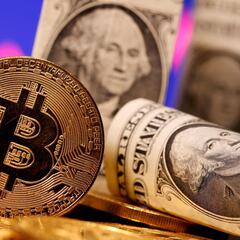Why has El Salvador bought so much Bitcoin and what are the risks?
The Central American nation has been put under pressure to remove bitcoin as legal tender as the volatile cryptocurrency lost half its value in a matter of weeks.


Back in September 2021, El Salvador became the first country in the world to recognize Bitcoin as legal tender, alongside the US dollar. This came with pledges to build a new city at the base of a volcano, paid for by Bitcoin.
Young President Nayid Bukele, a big cryptocurrency supporter, lauded the move as a way to push El Salvador into the front of the cryptocurrency trade, which many investors regard as the future of currency and investment.
Nope, I was wrong, didn’t miss it.
— Nayib Bukele (@nayibbukele) January 21, 2022
El Salvador just bought 410 #bitcoin for only 15 million dollars 🥳
Some guys are selling really cheap 🤷🏻♂️ https://t.co/vEUEzp5UdU
Now, the International Monetary Fund (IMF) has called for Bitcoin to be scrapped in the country and added extra pressure by saying future loans to El Salvador would be more difficult to acquire. The organization believes it is too volatile to be used as a national currency, and market trends in the last two months seem to agree.
Why is Cryptocurrency so volatile?
Despite it being legal tender in El Salvador, Bitcoin's utility as a currency is pretty much null considering how vastly and rapidly the value of it can change.
For example, Bitcoin is currently worth $36,329, slightly up on the $32,000 valuation of January 25. These values are both a far cry from the staggering high of $67,734 back in November. In the space of two months it lost over 50 percent of its value.
Now, try and apply that currency to buying a loaf of bread. How can it work?
El Salvador's bonds have been on a death spiral since Pres. Bukele’s #Bitcoin blunders began. Since June, ELSL bonds expiring in 2023 have lost 23% of their value & El Salvador struggles with a 35% risk of default. pic.twitter.com/agHMmqemSj
— Steve Hanke (@steve_hanke) January 27, 2022
And it's not just Bitcoin that has taken a tumble; many other cryptocurrencies have been hit by the slump. Ethereum, a common crypto for NFT users is also at its lowest since July, falling from over $3290 on January 20 to $2389 just five days later.
Bitcoin only really has a use as an investing tool or by investing into it. Until there is a stable rate for Bitcoin, which may be found when the last coins are mined, using it instead of traditional currency is more trouble than it is worth.
Related news:
- Which businesses accept payment with cryptocurrencies in the US?
- How do NFTs hurt the environment?
- How much has Bitcoin devalued since its all-time high?
- How are NFTs created? Why is bad their impact on environment?
What is El Salvador's background?
The economy in El Salvador has never been particularly stable, but there have been great strides taken to reduce poverty in recent years. Between 2007 and 2019, poverty fell from 39 percent to 22.3 percent, while absolute poverty has been almost completely eliminated, according to the World Bank. President Bukele has also proved popular for taking strides to tackle gang crime, although his methods for doing so have been under question.
Related stories
Conversely, the pushing of Bitcoin has not been so popular. El Salvador was rocked with protests in when the new currency came into effect, despite the handing out of $30 of bitcoin per person by the government.
Bukele was also criticized by rights groups for attacks on El Salvador's democratic structure. In September, he was given the green light to run for a second term after a constitutional court ruled he could run again, despite rules barring Presidents from running for second terms. This came after five Supreme Court judges and the attorney general were sacked.

